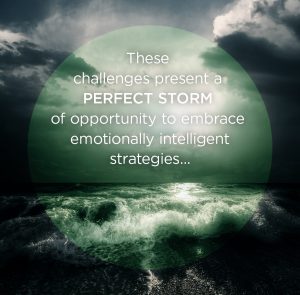Millennials Sprint to 2020 in the face of Four Big Obstacles
By 2020, Millennials will comprise nearly 50% of the US workforce. More than ever, it is urgent that organizations understand and value the four different generations and the gaps between them, which have many applications — the ways we buy and sell, lead and follow, communicate, and interact with authority and technology. Generational inclusion covers all of these topics and more. Research, backed up by life experience tells us that the different generations each come at life, work, and relationships from a distinct angle.
Intergenerational challenges present opportunities as well as potential pitfalls for ourselves and organizations, and we see more evidence of missteps almost every day. For example, one emerging challenge is the changing employee demographics, i.e., Millennials were brought up in a politically impressionable post 9-11 world, with ballooning government spending, two unpopular wars, The Great Recession, and the 2007 introduction of smart devices — the impact of these events will forever affect Millennials’ values, outlook, work ethic and leadership style.
For the aware and skilled, these challenges present a perfect storm of opportunity to embrace emotionally intelligent (EQ) strategies that will help you be a more effective communicator who can encourage a more relevant/inclusive organization, across the generations.

Have you noticed these four obstacles?
- Differences between older and younger Millennials are much more pronounced and amplified. Older Millennials (born ~ 1981-1990) are increasingly resistant to being labeled a Millennial and for good reason. Technology access/use, during the formative years, is profoundly different between older and younger Millennials (born ~ 1991-2000).
- Not feeling heard or valued and feeling out of sync or misaligned with the larger group are potent sources of stress and conflict for Millennials. Given that so many values and workplace expectations are rooted in generational perspectives, a generational lens provides many effective levers for stress and conflict management.
- Movement and promotion within an organization. “Promote me, or lose me,” (Millennial perspective) and “Pay your dues” (Baby Boomer and Traditionalist perspective) — distinct generational outlooks that are at odds and very much alive within most organizations.
- Recruiting and marketing efforts project a public face of your organization. How is it seen (and is it even noticed and seen) by the different generations? Generational sensitivity increases the likelihood that you are neither excluding certain generations nor baiting and switching by suggesting certain cultural truths that are not then followed up.
Millennials, do you agree?
Other generations, have you noticed these challenges in your workplace or relationships?
We have answers backed by research. Contact us today to schedule an educational and entertaining generational program with practical and actionable plans for navigating generational relationships, professionally and personally.
Demographic statistics from Pew Research and US Bureau of Labor Statistics 2016


Comments are closed.